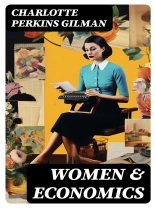In ‘Women and Economics, ‘ Charlotte Perkins Gilman presents a compelling examination of the economic roles of women in society, arguing for their financial independence and the structural changes necessary for gender equality. Drawing on social theory and the economic realities of her time, Gilman employs a blend of persuasive rhetoric and pragmatic analysis, characterized by her unique intersection of feminist thought and economic critique. The book situates itself within the broader context of early 20th-century feminist literature, challenging conventional norms and advocating for women’s contributions to the economy beyond domestic confines. Charlotte Perkins Gilman, a prominent social reformer and writer, was deeply influenced by her own experiences of gender roles and her contemporary societal conditions. Her personal struggles with mental health, alongside her advocacy for women’s rights and social reform, shaped her vision for a society where women could thrive independently. In crafting this work, Gilman aligns her theoretical frameworks with lived experiences, making her arguments resonate deeply within the feminist discourse of her time. ‘Women and Economics’ is a crucial read for anyone interested in understanding the economic foundations of gender inequality. Gilman’s innovative approach not only provides insights into the historical context of women’s economic status but also offers timeless perspectives that remain relevant in contemporary discussions on gender and economics. This seminal work invites readers to reconsider the indispensable role of women in the economy and the importance of feminist advocacy for societal progress.
Об авторе
Charlotte Perkins Gilman (1860–1935) was a prominent American feminist, sociologist, and writer of fiction and non-fiction. Born on July 3, 1860, in Hartford, Connecticut, Gilman grew up in a context of challenging economic conditions and fluctuating family fortunes, which influenced her lifelong advocacy for women’s economic independence. A central figure in the early women’s movement, Gilman gained critical acclaim through her works that addressed the social and economic roles of women in society. She is widely recognized for her groundbreaking book ‘Women and Economics’ (1898), an insightful analysis of women’s economic dependency and a call for women’s emancipation through work opportunities. Gilman’s eminently progressive views on gender roles and her straightforward writing style marked her as a pioneering thinker of her time. Her literary corpus includes both fiction, like the acclaimed short story ‘The Yellow Wallpaper’ (1892), which explores women’s health and the societal ignorance concerning female psychological experiences, and non-fiction that continues to inspire feminist scholarship to this day. Gilman’s work not only illuminates the gender dynamics of her own era but also resonates with contemporary discussions on feminism and economic equality.












